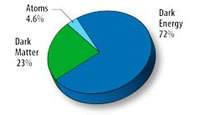Edward W. Kolb, PhD, a cosmologist at Fermi National Accelerator Laboratory and a professor at the University of Chicago, will deliver two talks Wednesday and Thursday, March 30 and 31, as part of the McDonnell Distinguished Lecture Series, sponsored by Washington University in St. Louis’ McDonnell Center for the Space Sciences.

Kolb
Kolb, who goes by the name Rocky, is the Arthur Holly Compton Distinguished Service Professor of Astronomy and Astrophysics and chair of the Department of Astronomy & Astrophysics. He is also a member of the Enrico Fermi Institute and the Kavli Institute for Cosmological Physics.
Kolb will give the McDonnell Lecture at 7 p.m. Thursday, March 31, in Room 100, Whitaker Hall, on the Danforth Campus.
The talk, which is free and open to the public, is titled “Mysteries of the Dark Universe.” It concerns the 95 percent of the universe that is made up of something other than atoms.
Astronomical observations suggest that most of the mass of the universe is in a mysterious form called dark matter and most of the energy in the universe is in an even more mysterious form called dark energy. The exotic dark energy has overcome the attractive forces of the dark matter and is driving the expansion of the universe at ever increasing speed. What is dark matter? What is dark energy? And what fate awaits the universe? This internationally famous cosmologist will provide lucid answers to these and other questions at the cutting edge of research in astronomy and physics.

That light blue sliver is the only part of the universe we can observe directly. The rest (and whatever it is there’s a lot of it) is a mystery.
Kolb also will deliver a colloquium, titled “Taking Sides on Dark Energy,” as part of the lecture series at 4 p.m. Wednesday, March 30, in Room 204, Crow Hall. A coffee reception will be held at 3:30 p.m. in Room 245, Compton Hall. Both are free and open to the public as well.
Kolb’s primary research interest is the application of elementary particle physics to cosmology and astrophysics. Most of his work has involved the study of the very early universe. He is the author, with Michael Turner, of The Early Universe, the standard textbook on particle physics and cosmology. His book for the general public, Blind Watchers of the Sky, received the 1996 Emme Award of the American Aeronautical Society.
But he also has a deep and abiding interest in science education. He was the recipient of the 2003 Oersted Medal of the American Association of Physics Teachers and the 1993 Quantrell Prize for teaching excellence at the University of Chicago.
In addition to writing articles for magazines and books, he teaches cosmology to non-science majors at the University of Chicago and is involved with pre-college education, participating in Fermilab’s Saturday Morning Physics Program for high school students and the Department of Energy’s high school physics program for gifted students, as well as lecturing in institutes and workshops for science teachers.
An entertaining speaker, he has traveled the world giving scientific and public lectures. He has appeared in several television productions and can also be seen in the IMAX film The Cosmic Voyage. In 1997, he made a memorable contribution to the legendary “Latke/Hamentaschen Debate,” in which he proposed to build a large accelerator that would accelerate these two delicacies to high speeds and smash them together in order to expose their fundamental nature. (This debate has been ongoing since 1946, when it first ignited at the University of Chicago.)
Born in New Orleans, Kolb earned a doctorate in physics from the University of Texas at Austin in 1978. Since then, he has authored more than 200 research papers.
The McDonnell Center, which was established in 1975 through a gift from the aerospace pioneer James S. McDonnell, is a consortium of WUSTL faculty, research staff and students coming primarily from the Arts & Sciences departments of earth and planetary sciences and physics, who are working on the cutting edge of space research.
For more information, call (314) 935-5332 or email trecia@physics.wustl.edu. To print a flyer that can serve as a parking permit valid in yellow zones, visit mcss.wustl.edu/events/2011/03/event-398.